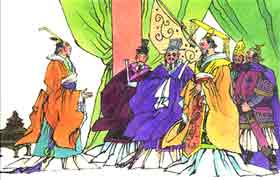
This set phrase is derived1 from the complaints Ji An made to the emperor.
Ji Anlived at the time of Emperor Wudi of the Western Han Dynasty (206 B.C.-A.D.24). He was respected for being upright and just and for daring to speak the truth. He did not bother about amall matters in personal behaviour and in being an official. He was particular about actual effects and ,although he did not cause a stir ,he could keep the prefecture he governed in perfect order. Because of this. the imperial court transferred him to the central government from being the perfect of the Donghai Prefecture to being a commander in charge of the appointment and dismissal of the local officals.
Once,Emperor Wudi said that he would implement2 the policy of benevolence3 and justice of Confucianism and would do good turns to the people.Emperor Wudi Had hardly finished his remards when Ji An said that there was no need for the emperor to say so.Why should the emperor bother,Ji An said, about pretending to implement the policy of benevolence and justice since he was so greedy and avaricious4 within himself? This choked the emperor off. The emperor suddenly Changed his countenance5 and declared the meeting over. All the civilian6 and military officers at court were breathless with anxiety for fear that Ji An might bring disaster upon himself because of this. After returning, Emperor Wudi said to the people around him that Ji An was a little too rude and too straightforward7.
For this reason ,Ji An was never promoted again. When he was the commander in charge of the appointment and dismissal of the local officials, both Gongsun Hong and Zhang Tang were low -ranking lfficials of little importance. Later ,they were promoted continuously. Gongsun Hong became the prime minister and Zhang Tang became the imperial censor8. However, JiAn's post remained thesame. One day, Ji An said to Emperor Wudi that the way the emperor used his ministers was just like piling up firewood, which meant that the latecomers surpassed the old-timers. Of course, Emperor Wudi could see that Ji An was complaining. So,turning to his ministers, Emperor Wudi said, "It is true that no one can stop learning.You see, Ji An is making more and more indiscreet remarks."
This story comes from The Historical Records. Later generations use the set phrase "the latecomers surpass the old-timers " to indicate that successors can cxcel the predecessors9, which is quite different from the original idea when Ji An said that the latecomers surpassed the old-timers.
汲黯是西汉武帝时代人,以刚直正义、敢讲真话而受人尊重。他为人和做官都不拘小节,讲求实效。虽然表面上不那么轰轰烈烈,却能把一个郡治理得井井有条,因此,朝廷把他从东海太守调到朝廷当主爵都尉——一种主管地方吏任免的官职。
有一次,汉武帝说要实行儒家的仁义之政,为老百姓办好事了。没等皇帝把话说完,汲黯就说:“陛下内心里那么贪婪多欲,表面上却要装得实行仁政,这是何苦呢?”一句话把皇帝噎了回去。汉武帝登时脸色大变,宣布罢朝,满朝文武都为汲黯捏着一把汗,担心他会因此招来大祸。武帝回到宫里以后,对身边的人说,汲黯这个人也未免太粗太直了。
从此以后,汲黯的官职再也没有提升。他当主爵都尉的时候,公孙弘、张汤都还是不起眼的小官,后来,他们一个劲儿住上升,公孙弘当上了丞相,张汤做上了御史大夫,可他汲黯还蹲在原地没动窝。有一天,汲黯对武帝说,陛下使用群臣,跟码劈柴一样,是“后来者居上”啊!汉武帝当然听得出这是发牢骚。于是,转脸对臣下们说:“人真是不能不学习啊!你们听汲黯说话,越来越离谱了!”
故事出自《史记·汲郑列传》。成语“后来居上”,往往指后起的可以胜过先前的。和汲黯说这话的原意,大不相同。
 收听单词发音
收听单词发音 
